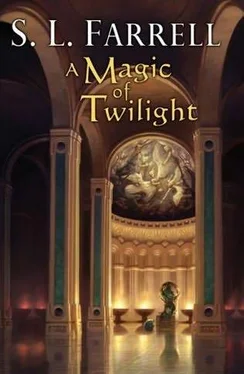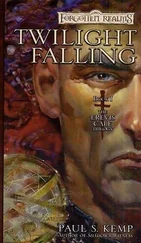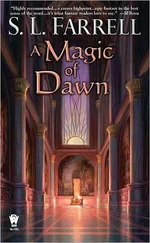S. Farrell - A Magic of Twilight
Здесь есть возможность читать онлайн «S. Farrell - A Magic of Twilight» весь текст электронной книги совершенно бесплатно (целиком полную версию без сокращений). В некоторых случаях можно слушать аудио, скачать через торрент в формате fb2 и присутствует краткое содержание. Жанр: Фэнтези, на английском языке. Описание произведения, (предисловие) а так же отзывы посетителей доступны на портале библиотеки ЛибКат.
- Название:A Magic of Twilight
- Автор:
- Жанр:
- Год:неизвестен
- ISBN:нет данных
- Рейтинг книги:3 / 5. Голосов: 1
-
Избранное:Добавить в избранное
- Отзывы:
-
Ваша оценка:
- 60
- 1
- 2
- 3
- 4
- 5
A Magic of Twilight: краткое содержание, описание и аннотация
Предлагаем к чтению аннотацию, описание, краткое содержание или предисловие (зависит от того, что написал сам автор книги «A Magic of Twilight»). Если вы не нашли необходимую информацию о книге — напишите в комментариях, мы постараемся отыскать её.
A Magic of Twilight — читать онлайн бесплатно полную книгу (весь текст) целиком
Ниже представлен текст книги, разбитый по страницам. Система сохранения места последней прочитанной страницы, позволяет с удобством читать онлайн бесплатно книгу «A Magic of Twilight», без необходимости каждый раз заново искать на чём Вы остановились. Поставьте закладку, и сможете в любой момент перейти на страницу, на которой закончили чтение.
Интервал:
Закладка:
S. L. Farrell
A Magic of Twilight
Prelude: Nessantico
If a city can have a gender, Nessantico was female.
She began life as a jewel in the glittering, slow waters of the River A’Sele. She was an island city in infancy, connected to land by massive stone bridges and connected by the A’Sele to the sea that nourished her with trade goods. The A’Sele bustled with ship-borne commerce from its convergence with the River Clario to the river’s wide, protected mouth in the Nostrosei, all of the largesse passing through Nessantico.
As the influence of the tribal chieftains who first settled Nessantico began to grow, so did the city, spreading out from the island to the banks on either side.
By the time the rulers of Nessantico began to call themselves Kraljiki and Kraljica, by the time they extended their rule beyond the city’s borders, she had grown into a vital young woman, swathed and armored in great walls that were never breached by any invader, her armies sweeping over the villages, towns, and city-states around her.
Irresistibly strong, she was also seductive: the city where the Kralji held their illustrious courts, where the ambassadors of a hundred lands came to beg and bargain and bluster, where ships from foreign lands of the Strettosei and the Rhittosei brought their goods and treasure, where a dozen cultures melded to form a stronger alloy, where the magical gifts of a dozen gods were displayed and sought after.
Over the decades and the slow centuries-as the country which took its name from her became yet more influential; as the Kralji became de facto rulers not only of Nessantico but of Il Trebbio, then Firenzcia, Magyaria, and more; as the Holdings spread out in all directions even across the Strettosei to the shores of the Westlands; as the Faith of Concenzia subsumed and forcibly converted the majority of the other religions and lesser gods within the Holdings, Nessantico-the city, the woman-allowed herself to relax and enjoy her reputation. Always strong even as the borders of the Holdings ebbed and flowed under the effects of war and commerce, always magnificent even as tastes and styles changed, always seductive and desirable no matter what other ex-otic lands and places might come into brief fashion, she spread steadily beyond the walls that had once confined her, gathering to herself all that was intellectual, all that was rich, all that was powerful. Her standard of deep blue and rich gold fluttered from the towers, and the lights of the teni glistened like star-jewels in the night.
There was no city in the known world that could rival her.
But there were many who envied her.
Beginnings
Ana cu’Seranta
Ana knelt down alongside the bed, smiling determinedly at the motionless, unresponsive body under the white linen sheet.
She took the woman’s hands: clammy and limp, the loose skin netted with fine wrinkles. “Matarh,” Ana whispered, then spoke her name, since Ana thought she sometimes responded better to that. “Abini, I’m here.”
Eyelids fluttered but did not open, and Abini’s fingers twitched once in Ana’s hand but failed to clasp hers in return. “It’s nearly First Call,” Ana continued, “and I’ve come to pray with you, Matarh.” The wind-horns sounded plaintively from the Old Temple dome at the same moment, muffled by distance and blurred with echoes from the intervening buildings. Ana glanced up; beyond the curtains, the sun glazed the rooftops of the city. “Do you hear the horns, Matarh? Listen to them, and I’ll pray for both of us.”
Ana placed her matarh’s hands together just under her throat, then clasped her own hands to forehead. She tried to pray, but her mind refused to calm itself. The comforting routine of the morning prayers was diluted with memories: of U’Teni cu’Dosteau’s rebukes, of her fading memories of the time before the Southern Fever left her matarh helpless and unresponsive, of the happier times before Ana had to bear the guilt of what she did nearly every morning just to keep her matarh alive.
“Forgive me, Cenzi,” she said, as she always did, wondering whether He heard, wondering when He would punish her for her impertinence- because that was what the Divolonte, the code of rules governing the Concenzia Faith, insisted must inevitably happen. Cenzi was a stern God, and He would insist that Ana pay for her impertinence in subvert-ing His intentions. “Forgive me. .”
She wondered whether she spoke to Cenzi or to her matarh.
She began to chant, the words coming unbidden: guttural nonsense syllables that were not the rigid forms U’Teni cu’Dosteau taught her.
Her hands moved with the chant, as if she were dancing with her fingers alone. Even before Vatarh had sent her to the Old Temple to become an acolyte, even before she’d begun to learn how to channel the power of Ilmodo, she’d been able to do this.
And even then, she’d known it was something she needed to hide.
She’d listened to the teni thundering their admonitions from the High Lectern enough to realize that. U’Teni cu’Dosteau, the Instruttorei a’Acolyte, was just as blunt and direct: “A teni does not thwart Cenzi’s Will unpunished. .” or “To use the Ilmodo for your own desires is forbidden. .” or “The Divolonte is clear on this. Read it, and if the harshness of it gives you chills, it should.”
Ana told herself that she wasn’t using the Ilmodo for herself, but for her matarh. She told herself that if it were truly Cenzi’s Will that Abini die, well, Cenzi certainly had the power to make that happen no matter what small efforts she might produce to keep her alive. She told herself that if Cenzi had not wanted her to do this, He would not have given her the Gift so early.
Somehow, it never quite convinced. She suspected that Cenzi had already chosen her punishment. She already knew His displeasure.
She shaped the Ilmodo now, quickly. She could feel the cold power of what the teni called the Second World rising between her moving hands, and her chant and the patterns she formed sent tendrils of energy surging toward her matarh. As the Ilmodo touched the prone body, Ana felt the familiar shock of connection. There was a hint of her matarh’s consciousness lost somewhere far below, and she felt that if she wished, she might, she might be able to pull her entirely back.
But that would have been truly wrong, and it would be too obvious.
So, as she had done for the last few years, she used just a touch of the Ilmodo, enough to ensure that her matarh would not sink any further away from life, enough for her to know that Abini would live for another few days longer.
And she let the Ilmodo go. She stopped her chanting, her hands dropped to her sides. The guilt-as always-surged over her like the spring flood of the River A’Sele, and with it came the payment for using the Ilmodo: a muscular exhaustion as severe as if she had been up all day laboring at some impossible physical task-once more, she would be fighting an insistent compulsion to sleep as she listened to U’Teni cu’Dosteau’s lectures. She clasped hands to forehead again and prayed for Cenzi’s understanding and forgiveness.
“Ana? Are you with your matarh?”
She heard her vatarh open the door to the bedroom. So quickly, Cenzi? she asked. Is this what I must bear for what I do? Ana bit her lip and squeezed her eyes shut, refusing to let herself cry.
“I know your presence comforts your matarh,” her vatarh said softly, coming up behind her. Tomas cu’Seranta had a voice that purred and growled, and once she’d loved to hear him talk. She would curl up in his lap and ask him to tell her a story, anything, just so she could lay her head against his broad chest and listen to the rumble of his deep voice.
Читать дальшеИнтервал:
Закладка:
Похожие книги на «A Magic of Twilight»
Представляем Вашему вниманию похожие книги на «A Magic of Twilight» списком для выбора. Мы отобрали схожую по названию и смыслу литературу в надежде предоставить читателям больше вариантов отыскать новые, интересные, ещё непрочитанные произведения.
Обсуждение, отзывы о книге «A Magic of Twilight» и просто собственные мнения читателей. Оставьте ваши комментарии, напишите, что Вы думаете о произведении, его смысле или главных героях. Укажите что конкретно понравилось, а что нет, и почему Вы так считаете.












